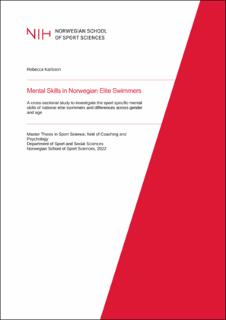| dc.description.abstract | Mental skills are important for athletes’ success. The goal of mental training in elite sport is to develop mental skills needed to achieve high level performance outcomes (Vealey, 2007). To reach a high level in any sport, a basic principle is that the physical training needs to be sport specific. This principle of specificity is also applicable for mental skills training. The best way to facilitate for high level performance in a sport is to incorporate the mental skills training with the physical training (Vealey, 2007), surely this is a reason to find out which mental skills that are important in the specific sport and for the individual athlete. The aims of this study were to provide an overview of Norwegian elite swimmers’ mental skills and to further suggest sport specific mental skills for swimming. Also, based on the conflicting findings in literature, we sought to identify if there were any differences in mental skills scores between gender (males/females) and age (senior/junior) in elite swimmers. To investigate this a cross-sectional study design was applied in form of a questionnaire, a translated version of the Ottawa Mental Skills Assessment Tool (OMSAT-3*; Durand-Bush et al., 2001) was used. This questionnaire had 48 items on 12 mental skill subscales, divided in to three broader psychological concepts (Foundation skills; goal setting, self-confidence, and commitment, Psychosomatic skills; relaxation, activation, stress reactions, and fear control, Cognitive skills; competition planning, imagery, mental practice, focusing, and refocusing). To further elaborate on mental skills in swimming, the differences between gender (female/male) and age (senior/junior) within the elite swimming population was analyzed. The results showed that Norwegian elite swimmers scored highest in the foundation skills: goal setting, self-confidence, and commitment. The results indicated differences between females and males in several of the mental skill subscales (self-confidence, activation, relaxation, stress reactions, imagery and focusing), no differences were found between senior and junior swimmers on the mental skill subscales. Results from multiple regression analyses indicated that selected mental skills (mental practice, focusing, activation, relaxation, and competition planning) contributed to the variance in the foundation skill scores. Swimming coaches should consider gender differences in mental training for elite swimmers. The results from the multiple regression analysis imply that mental practice, focusing, activation, relaxation and competition planning are important factors for the foundation skills scores in elite swimmers. This master thesis is written as a research article, including an extended introduction and method part. Firstly, the extended introduction and method is presented followed by the research article. | |
